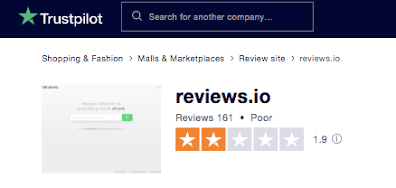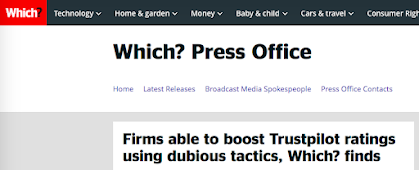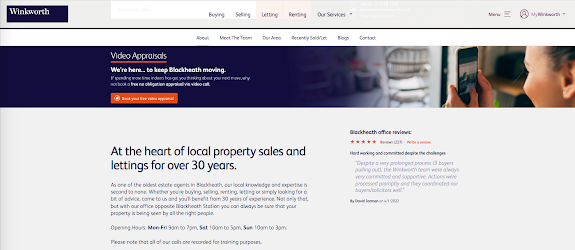Reviews have been around for nearly two decades now, but businesses remain confused, and understandably so. This article is designed to end that confusion, once and for all.
But first, let's look at why businesses engage with reviews in the first place:
- Consumers - just about all consumers - check reviews before even considering a particular product or service purchase nowadays; businesses with negative reviews or low scores suffer, businesses with great reviews and high scores prosper
- Businesses know that, so they want their reviews and scores to look their very best in search, irrespective of how the consumer may have come across them in the first place; it may be they've been recommended by a friend or colleague or seen some of the business's other marketing efforts, but they'll still reference the business's reviews
- Businesses are aware that their competitors understand the above two points and will be doing their very best to win the reviews race
It's just like advertising used to be: you advertised where your potential consumers were looking, be that in print, on TV/radio or on billboards and you wanted your advertisement to have the most impact, to impress your potential customers and to impress them more than your rivals, who were almost certainly advertising in the same media.
Google reviews
So now the Google reviews solution is looking less straightforward: how to demonstrate compliance with the law and, at the same time, maintain that flow of high-quality positive reviews? We all know that customers - for we are they when not wearing our 'work' hats - can be unreasonable, ill-informed, unfair, inaccurate in our recall of events and sometimes just plain wrong. How to play the reviews game without our business's reputation being harmed unfairly?Then along came Google. And in many ways life became simpler: you just wanted your business - your product or service - to look great in search. But then you realised that, unlike the 'old media', you couldn't be sure that your potential customer would see you at all. At least with a newspaper or magazine you could be sure they would turn the page and there your ad would be, or the same for TV in a commercial break. But with Google we all soon realised that appearing on page 2 of search was akin to promoting one's business in Timbuktu.Google, luckily for all of us, was pretty quick to understand that this benefitted neither business nor consumer (although it sure sold a lot of Google ads!). So they introduced reviews.Google reviews, after a sluggish start, partly because they were initially parked alongside Maps in Google Places, became the world-recognised benchmark for businesses as soon as they began being displayed in every search. If your business scored as close to the perfect 5.0 as possible and was shown on page 1 of search the enquiries and business would flow. If you scored less well and/or didn't appear on page 1 you needed to take action.Let's deal with the page 1 part first: any SEO agency would quite happily take £thousands of your hard-earned and promise you the earth. Stories of SEO horror used to be legion. Then Google introduced the Google My Business panel and let businesses and their web designers know that if they 'played the game' there - by providing the information Google knew searchers wanted - they would rank higher; no guarantees, but better than paying out thousands for paltry results.Then came reviews - and the Google reviews filter. So businesses went after reviews - positive reviews - to get both their scores and their absolute numbers of reviews up. The Google filter, when enabled by a searcher, simply displayed only businesses that scored 4.5 and up - after all, who would be looking for a business that scored less, right?Hot on the heels of this quest came hitch No 1: regulatory abuse. In the UK and the EU the law quickly caught up and stated - and still states today - that it would be illegal to only invite happy customers to write reviews (known as cherry-picking) and it would be even less desirable for businesses to come up with mechanisms to get only - or even mainly - positive reviews (known as gating).
Review sites
Well, the salesforces of the review sites, which had been around since way before Google reviews (which, in themselves, have never been actively 'sold' by Google), had their pitches honed: ignore Google reviews and focus on theirs. Not only would they display your reviews on their sites, Google would list links to them in search - well, somewhere in search - and they would give you wonderful dashboards to share with your marketing teams. Crucially, they would also be as 'helpful' as possible when it came to 'managing' negative reviews.The problems here - apart from the prominence of their brands in online retail marketing, where they were and are ubiquitous - were straightforward:
1. They just did not show up sufficiently in search, certainly by comparison with Google reviews. Go on: google any business and see whose reviews show. Google's reviews are right there every time.
reviews of Trustpilot on Reviews.io
reviews of Reviews.io on Trustpilot
2. They have attracted increasingly negative reviews of their own - just search for Trustpilot on Reviews.io or vice versa and you will see what we mean.
3. Negative mainstream media coverage has followed; the last thing any business needs is the credibility of their reviews platform being called into question.
4. Legal and compliance issues are enough to keep any corporate compliance officer continually at odds with their sales and marketing colleagues, as well as awake at night: 'We can't use/abuse customer reviews in that way!' - 'If we don't we'll look worse than our competitors.' 'But that's illegal.' 'How can we compete if we don't?'
There is a better - much better - way
Combine all of the advantages of Google reviews:
- visibility
- credibility
- SEO credit
- longevity
With the following:
- owning your own reviews - not possible with either Google or the review sites
- moderation - having your customers' reviews checked for factual accuracy and potentially misleading statements before publication
And it's called review management, but as far as service and professional businesses are concerned it's called 'having your cake and eating it.' All the wonderful benefits of Google reviews combined with a compliant and moderated platform that will enable everyone involved to relax in the sure knowledge that they are not flouting the law*.
We invented it and we have proven it, year in year out, for more than a decade now: legally compliant, owning your own reviews, displaying them on your website, getting them across to Google, contributing to your SEO.
And all for the cost of a mobile phone contract - except that we are so confident of the results we generate for our clients that we don't have contracts!
*the Law
This is a biggie; just because your main competitor has hundreds of great Google reviews and scores 4.8 doesn't mean you should emulate their review strategy. Just asking nailed-on happy customers to write reviews and/or running customer surveys to find out who loves you and then inviting them to write reviews is illegal. It also hands a big win to any competitor who understands just how the business gets to look so great.
One of the first rules of review management is that the business must be able to answer any potential criticism as to the veracity of their reviews - all our clients can point to the invitation on their websites (see 'Write a review' at top right)...
...and our 'promise to publish'. To see just how effective this can be just take a minute to read this story...
How about that? Now read some more detailed numbers here. And remember, you doctors and lawyers out there, these apply equally to you too!
In summary...
It often helps if the business asks itself the following simple questions:
1. Does looking great on Google matter to us (you might be surprised how many answer 'No' to that question - online retailers, large 'monopolies' - think mobile phone/utilities)? If the answer is 'yes' - as it should be for all service and professional businesses - then please read on. For businesses that already have Google reviews please pay especial attention to point 2.2. Does compliance with the law matter? We apologise for even asking this question but still, in 2022, at last half the businesses we speak to are horrified to find that they are unwittingly breaking the law - usually by cherry-picking or gating. The detail is here, but if your business is at all vulnerable to a well-written malicious review - and all service or professional businesses are - we suggest that a moderated review management system (see 3. below) is absolutely essential.Just speak to any business that has been a victim of such a review or read this article about a law firm that ended up having to sue one of its own clients because the review they had written was costing them tens of thousands in lost fees (as the judge in the case agreed).3. If looking great on Google matters - score and volume - do negative reviews that are inaccurate, misleading or just plain unfair matter? Of course they do - everyone reads them, and they're the single main reason some businesses are afraid of engaging with Google reviews (as well as being the single main reason that a searcher won't click through to a business's website). You need an independently moderated review management system that checks every single review before it's published. Moderation is explained here.4. Does ranking on Google matter? Do we need to rank high in search and look good there as well? This question is probably best answered graphically; here is a local search that features one of our clients:
Their specific search?
That's not putting anyone off clicking or calling, is it?
All legal, simple and most important of all: effective. Reviews from their own site showing with their listing and leading local search. Not looking bad on their own website either (where Google is pulling the information you can see in the search above)...
Price? Almost certainly less than the firm's daily petrol bill - per month! And no contract - ever.











No comments:
Post a Comment
HelpHound is all about feedback, so please feel free to comment here...